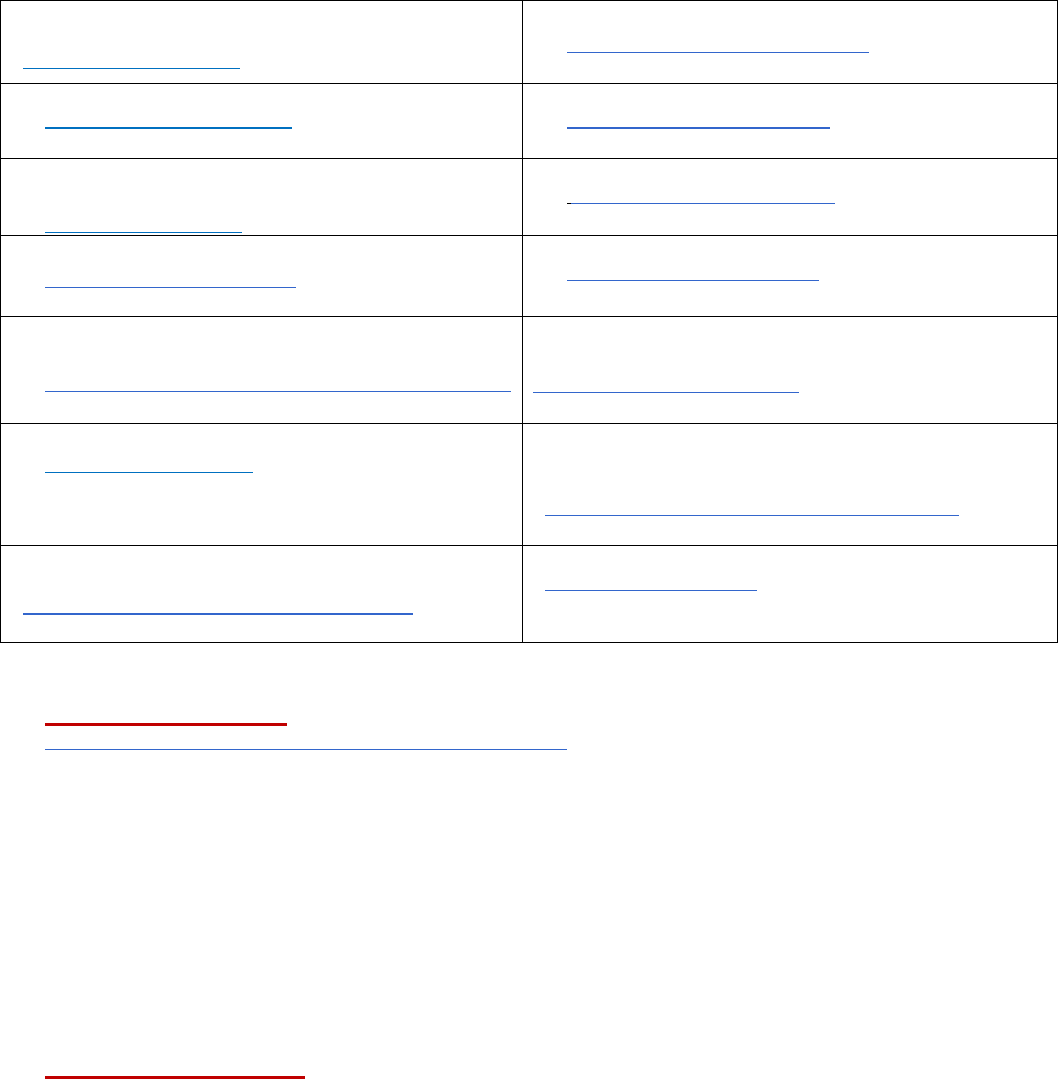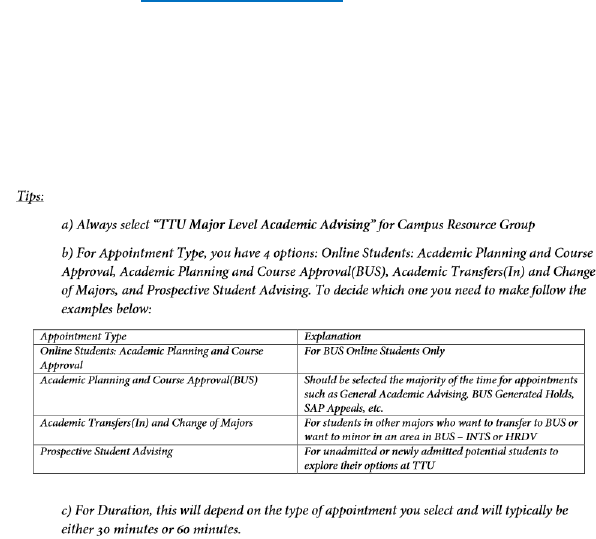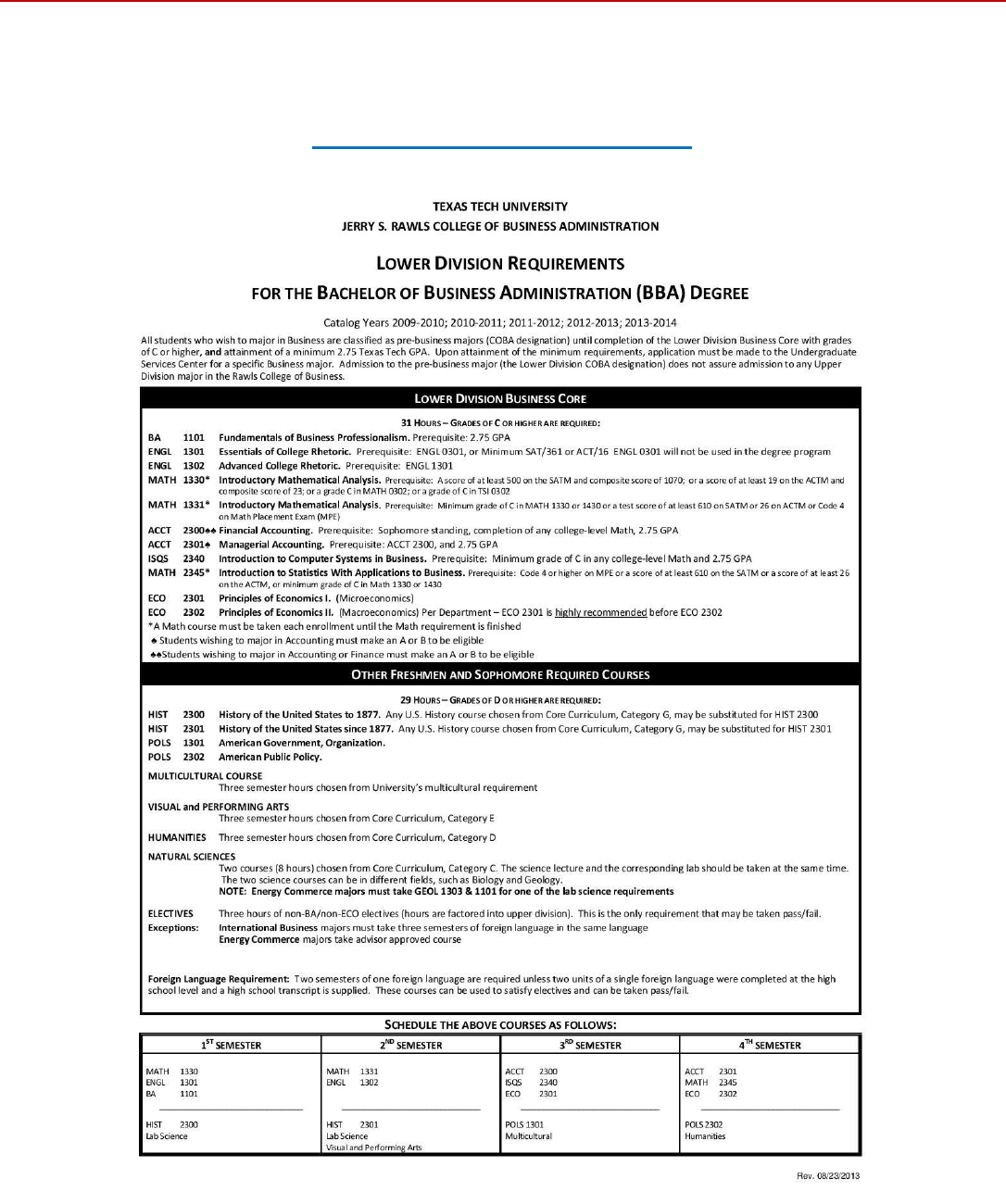
1
Table of Contents
Jerry S. Rawls College of Business 2
College of Architecture 6
College of Arts and Sciences 9
College of Visual and Performing Arts 13
Texas Tech University Honors College 17
College of Education at Texas Tech University 20
Edward E. Whitacre Jr. College of Engineering 23
College of Human Sciences 27
College of Agricultural Sciences and Natural Resources 31
College of Media and Communication 34
Other Programs 39

3
Additional Requirements for Declaring Majors (Upon Completion of Lower Division
Course):
Accounting:
To declare Accounting as a major, students must make an A or B in ACCT 2300 and ACCT 2301. A minimum 2.75 GPA is
required for this major. A minimum of 60 hours must be earned at Texas Tech University to qualify for graduation with
honors. This program by itself does not satisfy the educational requirements to take the CPA examination.
Energy Commerce:
A 3.4 GPA & completion of all lower level courses is required to take ENCO 3301 & ENCO 3385.
GPA calculation is based on degree applicable courses. Transfer courses are taken into consideration.
Due to sequencing of courses this degree program will take 2 academic years to complete.
GEOL 1303/1101 must be taken to satisfy one of the Laboratory Science requirements.
A minimum of 60 hours must be earned at Texas Tech University to qualify for graduation with honors.
Finance:
To declare Finance as a major, Students must make an A or B in ACCT 2300 and FIN 3320.
A minimum 2.75 GPA is required for this major.
A minimum of 60 hours must be earned at Texas Tech University to qualify for graduation with honors.
General Business:
A minimum 2.75 GPA is required for this major.
A minimum of 60 hours must be earned at Texas Tech University to qualify for graduation with honors.
International Business:
A 3.0 GPA is required for this major.
Students are classified as COBA (College of Business Administration) majors until the Lower Division Business Core has been
completed with grades of C or higher and a 3.0 or higher Tech GPA has been attained.
Management:
A minimum 2.75 GPA is required for this major.
A minimum of 60 hours must be earned at Texas Tech University to qualify for graduation with honors.
Management Information Systems:
A minimum 2.75 Tech GPA is required for this major.
A minimum of 60 hours must be earned at Texas Tech University to qualify for graduation with honors.
Marketing:
General:
A minimum 2.75 GPA is required for this major.
A minimum of 60 hours must be earned at Texas Tech University to qualify for graduation with honors.
Global Supply Chain:
A 3.2 Texas Tech GPA is required to take MKT 4370 & MKT 4371
A minimum of 60 hours must be earned at Texas Tech University to qualify for graduation with honors.
Sales:
A minimum 2.75 GPA is required for this major.
A minimum of 60 hours must be earned at Texas Tech University to qualify for graduation with honors.

4
Undergraduate Advising Contacts
Undergraduate Services Center (RCOBA), Room 145
Phone: 806.742.3171
Angela Buck
Accounting, General Business
Email: angela.buck@ttu.edu
Timothy Hendricks
Management Information Systems,
Accounting
Email: timothy.hendricks@ttu.edu
Kamerin Dickman
Finance, International Business,
Business Economics, General
Business.
Email: kamerin.dickman@ttu.edu
Kimberly Wake
Management, Marketing/Management, Undecided
Email: kim.wake@ttu.edu
Lisa Martin
Energy Commerce, Undecided
Email: lisa.martin@ttu.edu
To schedule an advising appointment, visit http://www.depts.ttu.edu/rawlsbusiness/about/usc/index.php and click on
“Schedule an appointment”
* NOTE: Athletes must call the advising office (806.742.3171) to schedule an advising appointment.
Involvement Opportunities
The Rawls College of Business has over 15 business-related student organizations. Some organizations are major-specific.
Others focus on developing tomorrow's business leader. We invite you to explore the many opportunities that exist.
Business Fraternities, Service, and Honors Organizations:
http://www.depts.ttu.edu/rawlsbusiness/about/studentorgs/
Alpha Kappa Psi
Website: http://akpsi.ba.ttu.edu/
Contact for information: vpm.akpsittu@gmail.com
Delta Sigma Pi
Website: http://dspttu.com/recruitment.htm
Contact for information: deltasigttu@gmail.com
Multicultural Student Business Association
Website: http://www.orgs.ttu.edu/msba/
Major Specific Organizations:
Accounting:
Accounting Leadership Council (ACL)
https://www.orgs.ttu.edu/alc/home.html
Energy, Economics and Law:
Energy Commerce Association (ECA)
http://ec.ba.ttu.edu/Center/eca/
Finance:
Finance Association
http://financeassociation.ba.ttu.edu/
Financial Advisors Society of Texas Tech (FAAST)
http://faastt.ba.ttu.edu/
Real Estate Organization (REO)
http://reo.ba.ttu.edu/home/
Marketing:
Tech Marketing Association (open to all majors)
http://www.tmattu.com/

5
COLLEGE OF ARCHITECTURE
Texas Tech University
Lubbock, Texas 79409
Phone: 806-742-3136
http://arch.ttu.edu/wiki/Texas_Tech_College_of_Architecture
The Bachelor of Science in Architecture is the pre-professional degree that gives students knowledge and career opportunities
in architecture, the building industry, and related fields. The degree consists of 131 credit hours of undergraduate courses.
Admission Requirements:
First-time Freshman Students
Once accepted into Texas Tech University, students are accepted into the general architecture program. After completion of
the first year, students will go through the Comprehensive Review to apply for admission into the pre-professional program.
Transfer Students
Transfer students must meet a minimum 3.0 GPA requirement. Students who do not have the minimum GPA requirement may
still take the first year architecture courses.
Students transferring in with Architecture credit
Students who are transferring with architecture credit from another institution must submit the following:
1. One page Statement of Intent indicating why you chose Architecture as a profession and what unique and diverse
perspectives you will bring to the College of Architecture.
2. Transcript.
3. Portfolio-8.5 x 11 is the recommended size for the portfolio. The portfolio should include a collection of design work
demonstrating the architectural abilities of the applicant. It should communicate the level, integrity, and breadth of
your aptitude for the study of architecture. The review committee is interested in evaluating architectural design
work, not the design of the portfolio. The portfolio should include work produced as a student and may also include a
selection of supporting self-directed or outside work (two pages maximum). It should be composed in landscape
(horizontal) orientation and demonstrate the applicant’s abilities in the following areas:
•
Design explored in two and three dimensions with drawings and models.
•
Appropriate use of media and craft in constructing drawings and models.
•
Understanding of plan, section, and three dimensional drawing to describe architectural space.
•
Freehand drawing.
•
Demonstration from studio courses that communicate your aptitude in construction technology, programming,
analysis and design by constructing drawings and models.
Check the Architecture website for submission dates.
Please mail the materials to the address below.
Academic Programs Office
College of Architecture
Texas Tech University
Box 42091
Lubbock, TX 79409-2091
Questions? Please feel free to contact us.
E-Mail: Architecture.Progra[email protected]du
Telephone: (806) 742-3136

6
Program Course Requirements:
General Architecture Program
This program has two components: general architecture and pre-professional.
Admission to the general architecture program is open to all students admitted into the university.
Admission into the pre-professional program is competitive and based on a comprehensive review of the student's portfolio,
essay, statement of intent, and grade point average.
First Year
SEEING
FOUNDATION
Fall
Spring
ARCH
1311
Design Environment
& Society
ARCH
1412
Arch. Design
Studio I
ARCH
1341
Arch. Freehand
Drawing
ARCH
1353
Digital Media I
MATH
1321
PHYS
1403
General Physics
I w/lab
CORE CURRICULUM
See Below
MATH
1350
Analytical
Geometry
CORE CURRICULUM
See Below
CORE CURRICULUM
See Below
TOTAL HOURS - 15
TOTAL HOURS - 17
***Pre-Professional Program
Students who have not been admitted to the pre-professional program are not eligible to take courses at the 2000 level and
above, except ARCH 2311 and 2315.
Summer
Session I
Session II
CORE CURRICULUM
See Below (Nat'l Lab
Science)
CORE CURRICULUM
See Below
CORE CURRICULUM
See Below
CORE CURRICULUM
See Below
TOTAL HOURS - 7
TOTAL HOURS - 6
Second Year
BASIC-INTERNAL
BASIC-EXTERNAL
Fall
Spring
ARCH
2501
Arch Design Studio II
ARCH
2502
Arch Design Studio III
ARCH
2311
Hist. of World Arch. I
ARCH
2315
Hist. of World Arch II
ARCH
2351
Arch. Construction I
ARCH
2342
Arch. Design Drawing
ARCH
3341
Digital Media II
ARCH
2355
Environmental Systems
CORE CURRICULUM
See Below
+Diversity Elective
TOTAL HOURS - 17
Elective
TOTAL HOURS - 17

7
CORE CURRICULUM
ENGL
1301
Essentials of College
Rhetoric
ENGL
1302
Advanced College
Rhetoric
MATH
1321
Trigonometry
MATH
1350
Analytical Geometry
PHYS
1403
General Physics I
w/Lab (4 hours)
Natural Lab Science
(4 hours)
POLS
1301
American
Government Organ.
POLS
2302
American Public
Policy
HIST
2300
History US to 1877
HIST
2301
History US since
1877
COMS
2300/3358
Third Year
BUILDING SYSTEMS
BUILDING ENCLOSURE
Fall
Spring
ARCH
3501
Arch Design
Studio IV
ARCH
3502
Arch Design
Studio V
ARCH
3350
Arch.
Construction
II
ARCH
3314
Arch. Hist. &
Contemporary
Issues
ARCH
3373
Environ.
Analysis/Site
Planning
ARCH
3352
Building
Information
ARCH
3313
Hist. of
World Arch
III
ARCH
3355
Construction
III
Elective
ARCH
Elective
TOTAL HOURS - 17
TOTAL HOURS - 17
URBANISM
Summer I and Summer II
++ARCH
4601
Architectural
Design Studio VI
TOTAL HOURS - 6
Fourth Year
Fall
ARCH
4341
Media
Elective
ARCH
4354
Integrative
Building
Modeling
ARCH
Elective
Elective - 3
TOTAL HOURS - 12

8
Advising:
Anna Martinez-Lopez
Undergraduate Advisor, Architecture
Email: anna.martinez@ttu.edu
Phone: 806.834.6821
Involvement Opportunities:
Organizations:
Knights of Architecture
Website: http://arch.ttu.edu/wiki/Knights_of_Architecture
Tau Sigma Delta
Website: http://arch.ttu.edu/wiki/Tau_Sigma_Delta
American Institute of Architecture Students
Website: http://www.ttuaias.org/

9
COLLEGE OF ARTS AND SCIENCES
Texas Tech University
P.O. Box 41034
Lubbock, TX 79409
Phone: 806-742-3831
http://www.depts.ttu.edu/artsandsciences/
Our departments offer over 120 degrees, are on the cutting edge of research, and are equipping students to succeed in our
ever-changing world by becoming life-long learners. Join over 8,000 undergraduate students and almost 1,300 graduate
students in the College of Arts & Sciences as you seek to achieve your goals at Texas Tech and beyond.
Find Us On Campus
Map to Holden Hall
Mailing & Phones
Texas Tech University
Office of the Dean
College of
Arts & Sciences
Holden Hall
Faculty Division:
Holden Hall 202
Student Division:
Holden Hall 102
Office of the Dean
College of
Arts & Sciences
Texas Tech University
Box 41034
Lubbock, TX 79409-1034
Faculty Division:
806.742.3833
Student Division:
806.742.3831
Fax:
806.742.0893
Admissions Requirements:
The admissions requirements of the college are the same as those for the university. Freshman or transfer students who are
considering majors within this college may be admitted into a general major known as Arts and Sciences Undeclared until they
select an Arts and Sciences degree program in which they intend to graduate. Students transferring from another institution
with less than 45 hours (including coursework in progress) may choose ASUD. Students who have completed 45 or more hours
must declare a major to be considered for admission to this college. Transfer students must have a minimum 2.0 transfer GPA
to enter the college.
Arts and Sciences Degree Options:
Department of Biological Sciences
•
Biology
•
Cell and Molecular Biology
•
Microbiology
•
Zoology
Department of Chemistry and Biochemistry
•
Biochemistry
•
Chemistry
Department of Classical and Modern Languages and
Literatures
•
Classics
•
French
•
German
•
Spanish
•
Latin American and Iberian Studies
•
Russian Language and Area Studies
Department of Communication Studies
•
Communication Studies
Department of Economics
•
Economics
•
International Economics
Department of English
•
English
•
Technical Communication
Department of General Studies
•
General Studies
Department of Geosciences
•
Geoscience
•
Geography

10
Department of Health, Exercise and Sport Sciences
•
Exercise and Sport Sciences
•
Health
Department of History
•
History
Department of Mathematics and Statistics
•
Mathematics
•
Mathematics and Computer Science
Department of Philosophy
•
Philosophy
Department of Physics
•
Physics
Department of Political Science
•
Political Science
Department of Psychology
•
Psychology
Department of Sociology, Anthropology, and Social
Work
•
Anthropology
•
Sociology
•
Social Work
Arts and Sciences Pre-Professional
•
Pre-Law
•
Pre-Dental
•
Pre-Medical Technician
•
Pre-Medicine
•
Pre-Nursing
•
Pre-Occupational Therapy
•
Pre-Optometry
•
Pre-Pharmacy
•
Pre-Physical Therapy
•
Pre-Physician’s Assistant
Arts and Sciences Interdisciplinary Programs
•
Actuarial Science
•
Asian Studies
•
Community and Urban Studies
•
Comparative Literature
•
Dramatic Writing
•
Environmental Studies
•
Ethnic Studies
•
European Studies
•
Family Life Studies
•
Forensic Science
•
Geographic Information Science
•
International Studies
•
Latin American and Iberian Studies
•
Linguistics
•
Religion Studies
•
Russian Language and Area Studies
General Degree Requirements:
Students must take major, minor, and elective courses sufficient to total 120 semester hours, although some majors may
require more total hours.
The minor may be any departmental minor, an established interdisciplinary minor, or a student-initiated interdisciplinary
minor (with approval of the associate dean in the Student Division of the College of Arts and Sciences).
Many departments and programs have residency requirements for the major and minor. See departmental or program
listings for specific information. Courses used to fulfill the writing intensive requirement are to be taken in residence at
Texas Tech.
Students should have selected their major and minor fields by the time they reach their sophomore year. For the major
subject they will be required to complete a minimum of 30 to 36 semester hours, including 6 hours of intensive
writing courses. At least 18 to 24 hours of the major subject must be in courses at the junior-senior level. For the minor, a
minimum of 18 semester hours must be completed (except in certain foreign languages as explained in the curriculum for
languages), at least 6 of which must be of junior or senior level. All courses in the major and minor must be approved by the
appropriate academic unit. Students are expected to develop a degree plan no later than the first semester of the junior year.
Forms and information are available in department offices.
A minimum of 40 semester hours of junior and senior work must be presented; not more than 8 hours may be counted in
applied music and/or music ensemble; not more than 8 hours of personal fitness and wellness as well as exercise and sport
sciences activity courses may be counted except for students offering exercise and sport sciences as a major, minor, or
specialization.

11
Advising Contacts:
Department
Advisor contact
Phone Number
E-mail address
Biology
Valerie Rogers
(806) 834-6538
valerie.a.rogers@ttu.edu
Pam Hellman
(806) 834-7429
pamela.hellman@ttu.edu
Chemistry and Biochemistry
Jeremy Mason
(806) 742-3282
jeremy.t.mason@ttu.edu
Classical and Modern Languages
and Literatures
Liz Hildebrand (Arabic,
Chinese, Japanese, Russian,
Spanish, Classics)
(806) 834-2463
liz.hildebrand@ttu.edu
Carla Burrus (French,
German, Italian, American
Sign Language)
(806) 834-3282
Communication Studies
Judy Poffenbarger
(806) 834-5382
judy.poffen[email protected]u
Economics
Sylvia Garcia
(806) 834-6266
sylvia.garcia@ttu.edu
English
Suzi Duffy
(806) 834-5471
Environmental Toxicology
Allyson Smith
(806) 834-3643
General Studies
Kristen Holcomb
(806) 834-5882
kristen.holcomb@ttu.edu
Geosciences
Eric Bruning (Atmospheric
Science)
(806) 834-3120
eric.bruning@ttu.edu
Celeste Yoshinobu (Geology
& Geophysics)
(806) 834-3229
celeste.yoshino[email protected]
Linda Jones (Geography)
(806) 834-8197
linda.jones@ttu.edu
Health, Exercise, & Sport Sciences
Jodi Dillard
(806) 834-0811
jodi.dillard@ttu.edu
Treasa Austin
(806) 834-4761
trea[email protected]du
Dana Wagnon
(806) 837-2278
dana.wagnon@ttu.edu
History
Jackie Manz
(806) 834-7856
jackis.manz@ttu.edu
Mathematics and Statistics
Patricia Schovanec
(806) 834-2018
Philosophy
Suzi Duffy
(806) 834-5471
Physics
Debra Boyce
(806) 742-3761
debra.boyce@ttu.edu
Political Science
Lauren Dent
(806) 834-7755
schedule appointments at
pols.ttuas.timetrade.com
Psychology
Maggie Durham
(806) 834-8617
Sociology, Anthropology, and Social
Work
Brenda Amin
(806) 742-2400
Involvement Opportunities:
Organizations:
American Association of Petroleum Geologists
Website: www.aapg.org
American Chemical Society - Student Affiliates
Website: http://www.acs.org/content/acs/en.html
Anthropology Society
Website: https://orgsync.com/44367/chapter
Army Reserve Officer's Training Corps (ROTC)
Website: http://armyrotc.ba.ttu.edu/
Association of Biologists:
Website: http://www.biol.ttu.edu/ttuab/home.aspx
Double T Health Service Corps
Website:
http://www.ttuhsc.edu/ruralhealth/studentorg.aspx
Dr. Bernard Harris Pre-Medical Society
Website: https://orgsync.com/3706/chapter

12
Gamma Beta Phi
Website:
http://ttu.orgsync.com/org/gammabetaphi7720/home
Pre-Pharmacy Club
Website: http://www.orgs.ttu.edu/prepharmacy/
Health Occupations Students of America
Website: https://orgsync.com/10288/chapter
Psi Chi - Honor Society for Psychology
Website: http://psichittu.weebly.com/
Howard Hughes Medical Institute Scholar Service
Organization
Website: https://orgsync.com/6536/chapter
Kinesiology & Athletic Society
Website: http://www.depts.ttu.edu/Hess/kas/index.php
Llano Estacado Student Chapter of the Society of
Environmental Toxicology and Chemistry
Website: https://orgsync.com/6553/chapter
Mathematical Association of America Texas Tech
Chapter
Website:
http://www.math.ttu.edu/Undergraduate/Resources/maa
/Welcome.html
Pre-Dental Society
Website: https://www.facebook.com/TTU.PDS
Society for Conservation Biology
Website: https://www.facebook.com/scbttu
Society for Technical Communication
Website: http://www.depts.ttu.edu/english/tcr/stc/
Society for the Advancement of Chicanos and Native
Americans in Science
Website: https://orgsync.com/27790/chapter
Society of Environmental Professionals
Website: https://orgsync.com/60297/chapter
Society of Physics Students
Website: http://www.phys.ttu.edu/~csaint/sps/
Student Association for the Institute of
Environmental and Human Health
Website: www.tiehh.ttu.edu/dept/Pages/TIEHH-SA.aspx
Pre-Medical Society
Website: http://premedicalsocietyttu.com/
Pre-Optometry Professional Society
Website: https://orgsync.com/3713/chapter
Student Chapter of the American Meteorological
Society
Website: https://www.facebook.com/pages/Texas-Tech-
Student-American-Meteorological-
Society/325750817458172?fref=nf
Pre-Physical Therapy Club
Website: https://orgsync.com/34397/chapter

13
COLLEGE OF VISUAL AND PERFORMING ARTS
Texas Tech University
P.O. Box 45060
Holden Hall Rm 203 Lubbock, TX 79409
Phone: 806-742-0700
http://www.depts.ttu.edu/cvpa/
The College of Visual and Performing Arts offers a diverse array of programs and courses in art, music, theatre, and dance. The
college seeks to prepare students who will be leaders in the profession by employing the highest standards in performance,
teaching, research, and artistic and creative vision.
Admission Requirements:
Students must meet the university-wide admission requirements stated in the catalog. Students requesting permission to
transfer from another college at Texas Tech must have an adjusted cumulative GPA of at least 2.00. In addition, they must
provide the Student Division office (123 Drane Hall) with a transcript of all academic work. Several majors in the College of
Visual and Performing Arts have additional admission requirements. The last 30 hours prior to graduation must be completed
while enrolled in the College of Visual and Performing Arts.
Degrees Offered:
The College of Visual and Performing Arts offers four distinctive Bachelor’s degrees in its units of Art, Music, and Theatre &
Dance.
The Bachelor of Arts (B.A.) is offered in Art, Dance, Music, and Theatre Arts.
The Bachelor of General Studies (B.G.S.) is a unique program for students who wish to study multiple fields in equivalent
depth.
The Bachelor of Fine Arts (B.F.A.) degree is offered with fields of specialization in Communication Design, Studio Art, and
Visual Studies (leading toward teacher certification); Theatre Arts: Acting or Design Technology.
The Bachelor of Music (B.M.) degree is offered with Fields of Specialization in Music Composition, Music Performance, Music
Theory, and Music (leading toward teacher certification).
For more information on the various degrees offered, check the corresponding entry in the Undergraduate Catalog.
Undergraduate Degree Requirements:
Bachelor of Arts in Art:
The Bachelor of Arts in Art will provide School of Art students with a liberal arts degree in art, offering a broader emphasis of
visual arts and related studies than is currently provided through the Bachelor of Fine Arts. The Bachelor of Arts degree is a
120-hour program that can be completed in four years and will include the requisite percentage of studio art, art history, and
general studies classes. The degree will provide students an opportunity to participate in a more individualized degree
through the choice of elective courses for a minor from outside the major area discipline that is consistent with the university
philosophy and policies for a liberal arts degree.
Bachelor of Fine Arts:
The Bachelor of Fine Arts in Art will provide School of Art students with a professional degree in art, offering a comprehensive
study with fields of specialization in either a 123-hour program in Communication Design, a 123-hour program in Studio Art,

14
or a 129-hour program in Visual Studies (leading toward teacher certification). These degrees can be completed in four years
and will provide students an opportunity to have an intensive and in-depth experience through visual concepts and practice.
Bachelor of Arts in Music:
A minimum of 42 hours of music courses, 18 hours of which must be junior or senior level, are required for the Bachelor of
Arts degree with a music major, including MUSI 1300, MUHL 2301, 2302, 2303, MUTH 1103 and 1203, 1104 and 1204, 2103
and 2203, 2104 and 2204, and 3303. Bachelor of Arts students are required to enroll in four semesters of ensemble and
lessons. The degree will provide students an opportunity to participate in a more individualized degree through the choice of
elective courses for a minor from outside the major area discipline that is consistent with the university philosophy and
policies for a liberal arts degree and complete the general degree requirements for the Bachelor of Arts degree. A minimum of
120 hours is required for this degree.
Bachelor of Music in Music:
The Bachelor of Arts in Music has four fields of specialization: Music (leading toward teacher certification), Composition,
Performance, and Theory. The performance field of specialization includes concentrations in piano, organ, voice, brass,
woodwind, percussion, and stringed instruments. The field of specialization in music that leads toward teacher certification
replaces the former Bachelor of Music Education.
For requirements in the fields of specialization in Composition, Performance, and Theory, consult the curriculum
tables that appear below.
Field of Specialization in Music Leading Toward Teacher Certification
The curriculum tables that follow are provided as a recommended sequence to students and advisors. All B.M. students
pursuing a field of specialization in music must plan their individual courses of study in consultation with the School of
Music advisor and consult the advisor for any revisions to the curriculum.
Students should contact the College of Education concerning professional education course requirements for all-level
certification.
Semester Hours
MUED 431\5 3
MUED 4323 3
MUED 3311 3
MUED 3312 3
Student 6
Teaching
TOTAL HOURS 18
All Level, Vocal Track
Principal Instrument: MUAP 1001, 1002, 2001, 2002,
3001 (2 credit hours each); 3002 (1), 3190
Diction I: MUAP 1303
Vocal Pedagogy: MUAP 4205
Conducting: MUAP 3206, and 3207
Piano: Must pass proficiency level equivalent to MUAP
2124 if not piano principal.
Music: MUSI 1101, 1300, 3216, 3237, and either MUSI
3238 or 3217
Music History and Literature: MUHL 2301, 3302,
3303
Music Theory: MUTH 1103 and 1203, 1104 and 1204,
2103 and 2203, 2104 and 2204, 3303
Major Ensemble: 7 semesters
Instrumental Ensemble: MUEN 2101 (1 semester)
Total Track Hours: 62
Total Program Hours: 122
All Level, Instrumental Track
Principal Instrument: MUAP 1001, 1002, 2001, 2002,
3001 (2 credit hours each); 3002 (1), 3190
Secondary Instrument: MUAP 1103, 1104, 2103, 2104,
3103, 3104, 4103, 4104 (select 5)
Conducting: MUAP 3206 and 3208
Piano: Must pass proficiency level equivalent to MUAP
2124 if not piano principal.
Music: MUSI 1101, 1300, 3237; either 3218 or 3325;
take one of MUSI 3226, 3238, and 3219
Music History and Literature: MUHL 2301, 3302,
3303
Music Theory: MUTH 1103 and 1203, 1104 and 1204,
2103 and 2203, 2104 and 2204, 3303
Major Ensemble: 7 semesters
Vocal Ensemble: MUEN 2102 (1 semester)
Total Track Hours: 62
Total Program Hours:122
All Level, Keyboard Track
Principal Instrument: MUAP 1001 (2), 1105, 1002
(2), 1106, 2001 (2), 2002 (2), 3001 (2), 3002 (1), 3190
Vocal Pedagogy: MUAP 4205
Conducting: MUAP 3206 and 3207 or 3208
Music: MUSI 1101, 1300, 3216, 3237, and either MUSI
3238 or 3217
Music History and Literature: MUHL 2301, 3302,

15
3303
Music Theory: MUTH 1103 and 1203, 1104 and 1204,
2103 and 2203, 2104 and 2204, 3303
Major Ensemble: 7 semesters
Ensemble: MUEN 2101 or 2102
Total Track Hours: 61
Total Program Hours: 121
Bachelor of Arts:
Theatre Arts Major. The number of hours required for the B.A. in Theatre Arts is 120, at least 40 of which must be at the
junior and senior levels. Students seeking a Bachelor of Arts in Theatre Arts must complete the following requirements in
addition to those required by the university and the College of Visual and Performing Arts: THA 1101, 1102, 1103, 1104, 1301,
2302, 2303, 3105, 3303, 3304, 3305, 3308, 3309, 3351, 4300, 4302, 4308, two hours of dance, and 6 hours of theatre arts
electives for a total of 49 hours. The degree will provide students an opportunity to participate in a more individualized degree
through the choice of elective courses for a minor from outside the major area discipline that is consistent with the university
philosophy and policies for a liberal arts degree.
Dance Major. Students accepted to Texas Tech University who wish to seek a Bachelor of Arts in Dance must also audition for
the dance program. Auditions are held every spring semester and consist of prospective students learning and performing
movement in modern, ballet, and jazz; solos will not be seen. Auditions also include an expository writing component.
Acceptance to Texas Tech University does not ensure admission as a dance major. The number of hours required for the B.A. in
Dance is 120, at least 40 of which must be at the junior and senior levels. The degree will provide students an opportunity to
participate in a more individualized degree through the choice of elective courses for a minor from outside the major area
discipline that is consistent with the university philosophy and policies for a liberal arts degree. Students seeking the B.A. in
Dance must complete the following requirements in addition to those required by the university and the College of Visual and
Performing Arts.
Bachelor of Fine Arts:
Students seeking pre-professional training leading to a B.F.A. degree in theatre arts major in either acting or
design/technology must be admitted to the B.F.A. program by audition and interview. Students are admitted at the discretion
of the faculty. Continuation in the program is dependent upon annual review and the faculty’s assessment of the
student’s timely progress. Students whose progress is found unsatisfactory will be placed on programmatic
probation.
Students on programmatic probation who fail to improve will be removed from the B.F.A. program. The number of hours
required for B.F.A. theatre majors is 120, at least 40 of which must be at the junior and senior levels.
Theatre and Dance Minors/Concentrations
Students working toward one of the four minors in theatre or dance must complete a minimum of 18-24 hours of specific
coursework. Hours applied to the minor area of study may not include courses used to fulfill requirements in the student’s
major. Because each minor takes at least four long semesters to complete, students should begin the minor in theatre or dance
as early as possible in their academic career. Prospective minors should meet with the theatre and dance advisor as soon as
possible for course information regarding prerequisites, availability, etc.
Teacher Education
Students desiring all-level certification in theatre arts must include the following courses within their overall degree plan: THA
1301, 2303, 2101, 2302, 3303, 3304, 3305, 3308, 3309, 4302, and one 3-hour theatre arts elective. Students desiring
secondary certification in dance must include the following courses within their overall degree plan: DAN 1100 (twice), 2202,
2301 (or VPA 2301 or DAN 4313), 2313, 3100, 3203, 3205, 3207, 3208, 3209, 3301, 3309, 4110, 4203, 4205, and 4207. The
overall degree plan for the B.F.A. or B.A. degree in theatre arts and for the B.A. degree in dance constitutes the academic major
for purposes of recommendation for teacher certification.

16
Advising:
Ryan Scheckel
Advisor, School of Art
ryan.scheckel@ttu.edu
Linda Gegston
Advisor, School of Music
Beth Scheckel
Advisor, Department of Theatre & Dance
beth.scheckel@ttu.edu
Kathy Nordstrom
Advisor, VPA - General Studies
***Please call (806)-742-0700 to schedule and advising appointment
Involvement opportunities:
Organizations:
http://www.depts.ttu.edu/cvpa/students/studentorganizations.asp
School of Art
Clay club
Metals Club
Print Club
School of Music
Goin’ Band from Raiderland
Court Jesters
Tau Beta Sigma
Kappa Kappa Psi
Department of Theatre & Dance
Chi Tau Epsilon (Honor Society)
Alpha Psi Omega (Honor Society)
University Dance Company
Script Raiders
Tau Beta Sigma
Kappa Kappa Psi
Department of Theatre & Dance
Chi Tau Epsilon (Honor Society)
Alpha Psi Omega (Honor Society)
University Dance Company
Script Raiders

17
TEXAS TECH UNIVERSITY HONORS COLLEGE
McLellan Hall, Room 103, MS 1017
Phone: 806-742-1828 Email: honors@ttu.edu
http://www.depts.ttu.edu/honors/
Honors College students have the unique advantage of experiencing a small, intellectually and socially vibrant environment
while having access to the vast resources of the major research university at TTU. Honors College students simultaneously
benefit from being with others of the same intellectual preparation and commitment while enjoying the advantages of a
university environment actively engaged in exploring all areas of human interest and concern.
Admissions Requirements:
Who is eligible to apply to the Honors College?
The minimum requirement for incoming freshmen:
An SAT score of 1200 or higher in critical reading and math, or a composite ACT of 26 or higher, or being within the top 10%
of the high school graduating class.
The Honors College application process is competitive and simply meeting one of the above criteria does not guarantee that
you will be admitted. While scores, grades and class rank are important, we make our admissions judgments based on a
portfolio of materials submitted, so there can be some flexibility in the numbers cited above.
If you have not met these criteria to apply, you may, in addition to the application, submit an essay that explains why you
have not met them, what you would contribute, and how you would benefit from membership in the Honors College.
The minimum requirement for current or transfer students:
•
A cumulative college GPA of 3.4 or higher.
Admitted Students:
After your are admitted to the Honors College, you will sign a contract in which you agree to take a minimum of 24 hours of
Honors classes and in which you are required to earn an A or B in those classes in order to receive Honors credit. Six hours of
those 24 must be Honors junior-level seminar courses. Six additional hours of those 24 must be Honors 3000- or 4000-level
courses. First-year college students are required to take a First-Year Experience class (FYE) and its accompanying Learning
Community Group (LCG). FYE classes are typically classes that fulfill core-curriculum credit but include the LCG as a built-in
mentoring program.
If you enter the Honors College after your first year and you do not take an FYE class, then you are required to complete 27
hours of Honors course credits.
Successful completion of these 24 Honors hours enables you to graduate with the designation "Honors College with Honors."
If you wish to graduate with the designation "Honors College with Highest Honors," you must write a senior thesis. The senior
thesis requires your taking six additional hours for Honors credit (e.g. two additional three-hour research classes with a
faculty mentor).

18
Benefits of Being Enrolled in the Honors College:
What are some of the specific benefits of membership in the Honors College?
•
Small, discussion-based classes (25 students or fewer), often with special topics and interdisciplinary approaches
•
Increased access to and interaction with faculty
•
One-on-one advising and problem solving from Honors staff
•
Study Abroad opportunities
•
National and international scholarship advising and opportunities, such as Rhodes, Marshall, Gates Cambridge,
Fulbright, Truman, Goldwater, and Udall
•
Special programs and/or admissions to the TTU Medical School and Law School
•
Undergraduate research opportunities, including financial support
•
Extended borrowing privileges from the University Library and special study areas
•
Facilities in the Honors College, a reading/study room and computer lab
•
Leadership, co-curricular, and service opportunities
•
Peer-Mentoring and support through the First-Year Experience classes and Learning Community Groups
•
First-day registration for classes each semester
•
Eligibility to live in Honors residence halls (space permitting)
Do I have to major in Honors?
There is no "Honors" major. Students enroll in an academic program in a college and department of their choice and they also
enroll in the Honors College at the same time, so most Honors students have dual enrollment in two colleges. The Honors
College offers one major, Honors Arts & Letters (HAL) and one minor, Environment and the Humanities (EVHM).
Students in the HAL program enroll only in the Honors College.
What kind of class commitment must I make to the Honors College?
After your are admitted to the Honors College, you will sign a contract in which you agree to take a minimum of 24 hours of
Honors classes and in which you are required to earn an A or B in those classes in order to receive Honors credit. Six hours of
those 24 must be Honors junior-level seminar courses. Six additional hours of those 24 must be Honors 3000- or 4000-level
courses. First-year college students are required to take a First-Year Experience class (FYE) and its accompanying Learning
Community Group (LCG). FYE classes are typically classes that fulfill core-curriculum credit but include the LCG as a built-in
mentoring program.
If you enter the Honors College after your first year and you do not take an FYE class, then you are required to complete 27
hours of Honors course credits.
Successful completion of these 24 Honors hours enables you to graduate with the designation "Honors College with Honors."
If you wish to graduate with the designation "Honors College with Highest Honors," you must write a senior thesis. The senior
thesis requires your taking six additional hours for Honors credit (e.g. two additional three-hour research classes with a
faculty mentor).
Honors Advising (No appointments by phone):
Watch for Your Advising Appointment Email. Students will receive an email from the Honors College providing a link to
our online scheduling tool, Genbook, which should be used for scheduling appointments. Genbook will be audited daily to
ensure that all student appointments are made during the appropriate dates for their classification.

19
Make the Earliest Possible Appointment. Advising appointments are limited, and permits into Honors courses are given
on a first-come, first-served basis. Therefore, it is important to make your appointment as early as possible.
***Please visit the Honors College advising office at McClellan Hall Rom 103 if you need assistance
Involvement opportunities:
Organizations:
Eta Omicron Nu
Website: http://www.depts.ttu.edu/honors/hon.php
Mortar Board
Website: http://www.orgs.ttu.edu/mortar-board/
Student Activities board
Website:
http://www.depts.ttu.edu/honors/SAB/index.php
Golden Key
Website: http://ttu.goldenkey.org/
Phi Kappa Phi
Website:
http://www.depts.ttu.edu/honors/phikappaphi.php

20
College of Education
Texas Tech
University 3008
18
th
Street
Lubbock, TX
79409
Phone: 806-742-1997
http://www.depts.ttu.e
du/education/
Program Requirements:
Core Curriculum Requirements. The university has established core curriculum requirements for all students. These
requirements will ensure breadth in each academic program. Students should consult their academic advisor
regarding specific course requirements. Students are urged to seek advisement prior to their first enrollment to avoid
losing credit. Students may find a listing of core curriculum requirements in the Undergraduate Academics section of
the catalog.
Advisory Program. The advisory program is designed to provide aid to each student in planning and completing the
appropriate degree and teacher certification program. The academic advisor is responsible for (1) assisting the student in
planning a program and in updating degree plans, (2) helping the student in selecting the proper areas of certification
and/or teaching fields, and (3) advising the student in meeting admission and retention standards of teacher education
and student teaching.
Admission to the Bachelor of Science Degree Program and Admission to the Teacher Certification (Education)
Program. The college seeks to maintain rigorous academic programs to produce outstanding educators for Texas and the
nation. Admission to college degree and certification programs is open to all individuals on the basis of academic
preparation, ability, and availability of space in the program selected. When there are more qualified applicants than can
be adequately instructed by available faculty or accommodated in available facilities, the college will control enrollment in
specific programs by limiting the admission of new students. The number of students accepted into the undergraduate
programs is limited. Therefore, admission into a teacher education program is competitive and based on GPA and other
criteria. A complete description of eligibility requirements is available in the Certification Office in the College of
Education. (Entrance criteria may be subject to change.) Admission to a college degree program does not ensure admission
to an upper-division teacher certification program. See “Educator Certification” on page 276 to read about admission
requirements for the teacher certification program, information on the Texas Examinations for Educators Standards
(TExES), recommendations for teacher certification, admission to student teaching, and transferability.
Academic Foundations. During their freshman and sophomore years, students normally complete their general degree
requirements for both the Bachelor of Science degree and a teaching certificate. Coursework in professional education and
advanced courses, particularly in academic specializations or teaching fields, is usually taken in the junior and senior
years.
Professional Education. Teacher education programs in the College of Education are field-based. Students will
complete observations and activities in public school settings. These field experiences may require time in addition to
class time to complete.
Full-Year Student Teaching. Teacher candidates will be assigned to a classroom for a full year of student teaching.
Appropriate coursework will accompany both semesters of student teaching. All students seeking initial certification at
Texas Tech must successfully complete a series of competency-based performance assessments to be recommended by
the university for a teaching certificate.
Clinical Experiences. TechTeach is a field-based teacher education program. In the semesters prior to student teaching,
teacher candidates will spend one day each week in a public school setting. For candidates in secondary education, this

21
will be their first block of the teacher education program; for elementary and middle-level candidates, it will be the first
and second blocks. Assignment to apply and evaluate what candidates have learned in the courses will be completed in the
school settings.
Student Load. The maximum load for a student in the College of Education is 19 semester hours. No student will be
permitted to enroll in more than 18 semester hours without written approval from the department chair or associate dean.
During the
student teaching semester, the maximum load is 12-15 semester hours. Requests to take more than 15 hours must be
approved by the certification officer.
Length of Degree Program. The Bachelor of Science degree can be completed in approximately eight semesters. The
multidisciplinary studies major requires 123-129 hours, and the multidisciplinary science major requires 127-128 hours.
A student may be required to attend summer term to complete all requirements. Assistance in completing the degree and
certification plan is provided by advisors in the College of Education. An Intent to Graduate form should be filed with an
advisor one year prior to graduation.
Pass/Fail Option. Courses used to meet stated degree plan requirements may not be taken pass/fail. Up to 13 hours of
courses that are taken as free electives to total 133 hours and are not used to meet any other degree requirement may be
taken pass/fail. Courses that are designated pass/fail by departmental policy rather than student choice do not count in
the 13-hour limit on elective courses that may be taken pass/fail. A student on probation is not allowed the pass/fail
option.
Education Minor. Students seeking secondary certification may minor in secondary education. The following courses may
be used by students who complete student teaching as undergraduates: EDSE 4000 (9 to 12 hours), 4312, 4313, 4315,
4316, 4322; and EDLL 4382. The minimum number of hours for a minor in secondary education is 18. Other education
courses may be used in the minor with the permission of an academic advisor in the College of Education.
Undergraduate Program
B.S. in Multidisciplinary Studies
Middle-Level Education. This specialization within the B.S. in Multidisciplinary Studies is designed primarily for
individuals seeking teacher certification in grades four to eight. Students may choose certification in English language
arts/social studies or math/science. Students should consult with an advisor in the college to determine which degree
plan best suits their career aspirations. Degree plans leading to the different certificates will include subject area
coursework and a sequence of four semesters of professional education courses (including two student teaching
semesters). All courses include field experiences scheduled outside of class time.
Bilingual Education. This speicalization within the B.S. in Multidisciplinary Studies is designed to prepare those who wish
to be certified as an elementary generalist and as a bilingual generalist teacher. The specialization includes coursework in
Spanish and certification requires passing the Texas Oral Proficiency Test in Spanish as well as TExES exams. Students will
complete four semesters of professional education work that includes field experiences in elementary and in bilingual
settings in area schools.
Special Education. Students wishing to become certified as an elementary generalist and as an all-level special education
teacher for children from early childhood to grade twelve will seek a B.S. in Multidisciplinary Studies with a specialization in
special education. Students will complete four semesters of professional education work with field experiences in
elementary and in special education settings.
English as a Second Language. Students wishing to become certified as an elementary generalist with additional
certification in English as a second language (ESL), will seek a B.S. in Multidisciplinary Studies with a specialization in ESL.
Students will complete four semesters of professional education work with field experience in elementary and ESL
classrooms.
Elementary Math/Science Emphasis. This speicalization within the B.S. in Multidisciplinary Studies is designed to prepare
those who wish to emphasize math and science courses as they prepare to be certified as an elementary generalist.

22
B.S. in Multidisciplinary Science
Secondary Science Education. Individuals completing the B.S. in Multidisciplinary Science—both the baccalaureate
requirements and the certification requirements—are eligible for certification to teach all sciences grades eight to twelve in
Texas. This major requires 57 to 61 semester hours in science. All individuals in this major are required to complete CHEM
1107, 1108, 1307, 1308, PHYS 1403, 1404, GEOL 1101, 1102, 1303, 1304, BIOL 1403 1404, ATMO 1300, ASTR 1400, and
1100.
Students will choose an area of emphasis from among the sciences (biology, chemistry, geosciences, physics or life and
earth sciences) and complete additional coursework. Students seeking certification must minor in secondary education.
Students
not seeking certification must have a minor in an area other than education. Students should consult advisors so that
prerequisites and other requirements may be met in a timely manner. Two semesters of a single foreign language are
considered leveling work for this program, but may be waived if the student had two years of high school foreign language.
Undergraduate Advisors:
Connie Watson
Lead Academic Advisor
connie.watson@ttu.edu
806-834-1307, rm 251
Earnestine Frazier
Elementary EC-6 Math/Science, Early Childhood, UI, Deaf
and Hard of Hearing
earnestine.frazier@ttu.edu
806-834-0220, rm 255
Involvement Opportunities
Chris Covarrubio
Secondary and Middle Level
chris.covarr[email protected]du
806-834-3957, rm 254
Jana Allen
EC-6 Bilingual, ESL, Special Education
jana.allen@ttu.edu
806-834-7201, rm 252
Get involved with the College of Education!
Organizations:
Education Ambassadors
Website: http://www.educ.ttu.edu/student-
life/ambassadors/default
National Science Teachers Association (NSTA)
Advisor: Dr. Susan Talkmit and Dr. Walter Smith
Website: http://www.orgs.ttu.edu/nsta/officers.html
Texas State Teachers Association – Student Program
(TSTA-SP)
Advisor: Dr. Peggy Price
Website: http://ttutstasp.weebly.com
Bilingual Student Organizations (BESO)
Advisor: Eva Midobuche
Website: https://orgsync.com/42512/chapter

23
Edward E. Whitacre Jr. College of Engineering
Texas Tech University
P.O. box 43103
Lubbock, TX 79409
Phone: 806-742-3451
http://www.depts.ttu.edu/coe/
Admission to a WCOE Degree Program. All newly admitted students work to complete a foundational curriculum consisting
of English I, English II, Calculus I, Calculus II, Physics I (calculus-based) plus another science course and a first engineering
course that vary among the engineering degree programs. The foundational curriculum is supplemented with courses from
the university core curriculum and general engineering courses (statics, thermodynamics, circuits, and materials science) to
provide the opportunity for full course loads and scheduling flexibility.
When the foundational curriculum has been completed, students apply for admission to the upper division of their degree
program. The acceptance criterion is based exclusively on a Texas Tech cumulative GPA that includes a minimum of 12 hours
of coursework from the foundational curriculum. The specific GPA standard varies among the degree programs and may
change from one academic year to the next as necessary to align enrollments with educational resources.
Students must be prepared to make an alternate choice of major if their foundational curriculum GPA does not qualify them
for their preferred major. Students must make progress appropriate to their classification in their alternate choice of major as
determined by each department for their degree programs. Students who are not admitted successfully to an upper-division
degree program are not allowed to enroll in engineering courses and must transfer out of WCOE.
Refer to the program descriptions in this catalog for the specific foundational curriculum and upper-division GPA admission
standards.
Pre-Engineering. Students who do not meet the WCOE admission requirements are admitted initially to the Texas Tech Pre-
Engineering Program and may apply for admission to the WCOE foundational curriculum upon satisfaction of the college
internal transfer admission standards.
WCOE has partnered with Texas Tech University Advising to create the Pre-Engineering Program. This student retention and
success initiative provides intense academic advising and support as students build the requisite math skills to be successful in
an engineering degree program. While in Pre-Engineering, students will enroll in typical university core curriculum and
foundational curriculum courses.
Engineering presents an extremely challenging course of study. For students who determine that engineering is not an
appropriate choice, the advisors in University Advising have the specialized training and tools necessary to assist students in
finding a course of study that is best suited to their unique talents and interests. The ultimate priority is for every student to
graduate successfully from a best-fit major.
External Transfer Admission to WCOE Foundational Curriculum. A transfer student with fewer than 12 hours of
transferable coursework must meet first-time freshmen assured admission standards. For admission to the foundational
curriculum with an engineering degree program concentration, transfer students must have 24 or more hours of transferable
coursework and have a minimum cumulative GPA of 3.0 that includes the work at all previous institutions. External transfer
students must complete a minimum of 12 hours of Texas Tech engineering degree program coursework before application to
the upper division. Eligibility for admission to the upper division is based exclusively on the cumulative GPA earned at Texas
Tech (2.5 or higher).
Second Degree Transfer Admission. Students holding a bachelor’s degree from another institution must have a 3.0
cumulative GPA from that institution to be admitted to the WCOE foundational curriculum.
Internal Transfer Admission to WCOE Foundational Curriculum. Students entering Texas Tech and transferring to WCOE
from other colleges within the university must have a minimum Texas Tech cumulative GPA of 3.0 on at least 12 hours of
Texas Tech coursework that is included in the foundational curriculum.

24
WCOE Academic Standards and Requirements:
Progress Towards a Degree. WCOE students are expected to maintain good engineering academic standing (cumulative
Texas Tech GPA of 2.5 or higher). Engineering students are expected to maintain continuous progress toward completion of
their degree program regardless of catalog year. Specifically, a full-time student must achieve a C or better in 18 hours of
coursework included in the degree program each year (two long semesters). Continued acceptance within WCOE for students
who do not maintain this level of progress is subject to the discretion of the dean of the college.
WCOE Continued Academic Probation. A probationary student whose current GPA is 2.5 or higher but whose cumulative GPA
is below 2.5 will be placed on “WCOE continued academic probation” until the cumulative GPA is 2.5 or higher. The student
may not enroll for more than 14 hours without prior approval from an advisor or academic dean. Students will not be allowed
to be on WCOE academic probation for more than two consecutive long semesters (summer not included). Failure to meet the
conditions established will result in WCOE Expulsion.
WCOE Expulsion. A student on WCOE probation who has a current or cumulative GPA below 2.5 at the end of a two
consecutive semesters will be on WCOE Expulsion unless grade replacements for courses completed at that time raise the
cumulative GPA above 2.5. A student on WCOE Expulsion is not permitted to take engineering courses.
Students may not return to WCOE after a WCOE Expulsion. Students are not eligible to enroll in engineering classes due to
their GPA. Students should make an appointment with University Advising (advis[email protected]u) to seek guidance on other
degree programs offered by Texas Tech.
Repeated Courses. Students will only be allowed to attempt any engineering course twice to obtain a grade of C or better. The
grades of D, F, and DG require a second attempt. Additionally, if a student earns a grade of D or F in a prerequisite to a required
course, the student must retake the prerequisite course before enrolling in the required course. If the student’s second attempt
at an engineering course does not result in a passing grade, the student will not be permitted to continue studies in an
engineering program. The engineering dean hold will not be released until the student has successfully transferred to a new
college to pursue a new program of study. The student should make an appointment with University Advising
(advising@ttu.edu) to seek guidance on other degree programs offered by Texas Tech.
Students may repeat up to three engineering courses during their program of study. Upon the need to repeat their fourth
course, students will not be permitted to continue studies in an engineering program. The engineering dean hold will not be
released until the student has transferred to a new college to pursue a new program of study. The student should make an
appointment with University Advising (advising@ttu.edu) to seek guidance on other degree programs offered by Texas Tech.
Course Substitutions. Any substitution of courses specified in a degree program requires the written approval of the chair of
the student’s major department and the dean of the WCOE. Degree credit for electives requires written approval by the chair
of the department involved. A list of acceptable technical electives for a degree program can be obtained from the department.
Courses considered remedial, duplicative, or inferior will not be accepted.
Multicultural Credit. The WCOE encourages students to seek multicultural credit using the international experience required
of all students entering in Fall 2013 or later. To obtain multicultural credit, students must complete the Global Scholars
Certificate Program, which is available through http://globalscholar.us/. The Global Scholar submissions will be reviewed by
the Study Abroad Office.
Pass/Fail. All courses used to satisfy the degree program requirements must be taken for a grade. The pass/fail option is not
allowed.
Transfer Course Evaluation. Students from community colleges generally transfer courses in English, history, political
science, mathematics, and science. Community colleges that adequately prepare students to study engineering have
designated faculty who function as liaisons between their schools and WCOE. Such cooperative arrangements provide
students an opportunity to choose courses at the community college that are required by a specific engineering major.
Problems in transferring are minimized by the student’s early awareness of the WCOE curriculum and early commitment to
transferring to Texas Tech. Courses transferred from another institution will be evaluated for use in a given degree program.
Each department evaluates transfer courses associated with courses taught in that department.

25
Grades for Transfer Courses. The highest grade for a repeated course, either at Texas Tech or another institution, will be the
grade used to determine acceptance of the course for a degree program. Only courses with a grade of C or better will be
accepted for use on an engineering degree plan.
Meet Your Undergraduate Advisors:
Margaret Ceja
Advisor, Dept. of CEET
Room: CEET 225C Phone: 806-834-6063
Email: margaret.ceja@ttu.edu
Jacob Grace
Undergraduate Academic Advisor, Dept. of ME
Room: ME 140 Phone: 806-742-3463
Email: jacob.grace@ttu.edu
Cody Henley
Academic Advisor, Dean’s Office
Room: EC 102 Phone: 806-834-8611
Email: cody.henley@ttu.edu
D’Maris Murillo
Academic Advisor, Dept. of ME
Room: ME 140 Phone: 806-834-7634
Email: dmaris.murillo@ttu.edu
Alex Newsom
Academic Advisor, Dept. of CEE
Room: CECE 168 Phone: 806-834-
1444
Email: Alexandria[email protected]
Jennifer Maddox
Academic Advisor,
Room: ECE 224 Phone: 806-834-0053
Email: jennifer.maddox@ttu.edu
Patricia Rodriguez
Undergraduate Advisor, Dept. of CS
Room: EC 211B Phone: 806-742-3527
Email: patty.rodrig[email protected]u
Kristina Thompson
Undergraduate Advisor, Dept. of CHE
Room: CHE 211 Phone: 806-834-1012
Email: kristina.thompson@ttu.edu
Engineering Involvement Opportunities:
Organization:
Alpha Omega Epsilon
http://ttu.orgsync.com/org/alphaomegaepsilon
Associated General Contractors of
America
http://www.orgs.ttu.edu/agc/aboutAGC.html
American Society of Mechanical Engineers
http://www.orgs.ttu.edu/asme/
Association for Computing Machinery
https://orgsync.com/6512/chapter
Amateur Radio Society at Tech
https://www.facebook.com/k5ttu
American Society of Civil Engineers
http://www.orgs.ttu.edu/ASCE/
American Institute of Chemical Engineers
https://sites.google.com/site/aichetexastech/
Society of Environmental Professionals
https://orgsync.com/60297/chapter
American Association of Drilling Engineers
http://www.aade.org/chapters/permian-
basin/student-section-texas-tech/
Society of Petroleum Engineers (AKA: American
Society of Petroleum Eng)
http://www.spe.org/chapters/?5555

26
American Society of Heating, Air Conditioning and
Refrigeration Engineers
https://www.ashrae.org/
Human Factors and Ergonomics Society
http://ttu.orgsync.com/org/ttuhfes
Formula SAE - Society of Automotive Engineers
http://aln.coe.ttu.edu/saef1/
Society of Petroleum Engineering Educators
http://www.spe.org/industry/
The International Association for the Exchange
of Students for Technical Experience
http://www.iaeste.org/
Society of Women Engineers
http://www.orgs.ttu.edu/swe/
Institute of Industrial Engineers Website:
http://www.orgs.ttu.edu/iie/
Solar Racing Team
http://www.solarcar.ttu.edu/
Institute of Transportation
Engineers
https://www.depts.ttu.edu/transtech/ITEchapter.html
Texas Society of Professional Engineers (Student
Chapter)
http://www.orgs.ttu.edu/tspe/
National Society of Black Engineers
http://www.ttusbe.com/
Chemical Engineering Graduate Student
Association
Website:
https://sites.google.com/site/chegsa2011/home
Engineering
Ambassadors Website:
http://www.depts.ttu.edu/coe/ambassadors/
Engineers Without Borders
http://www.ewbttu.org/
Honorary Societies:
http://www.depts.ttu.edu/coe/undergraduate/stud_orgs.php
Organization
Abbreviation
Industrial Engineering Honorary
Alpha Pi Mu
Civil Engineering Honorary
Chi Epsilon
Electrical Engineering Honorary
Eta Kappa Nu (HKN)
Chemical Honorary
Omega Chi Epsilon
Petroleum Engineering Honorary
Pi Epsilon Tau
Mechanical Engineering Honorary
Pi Tau Sigma
Engineering Technology Honorary
Tau Alpha Pi
Engineering Honorary
Tau Beta Pi
Contact Information:
For more information on student organizations, contact:
Jamie Perez
Assistant Director – Engineering Opportunities Center
Edward E. Whitacre Jr. College of Engineering
Box 43103, Engineering Suite 100
Lubbock, TX 79409-3103
T 806.742.3451 F 806.742.3493
jamie.l.perez@ttu.edu

27
College of Human Sciences
Texas Tech University
P.O. Box 41162
Lubbock, TX 79409
Phone: 806-742-1180
http://www.depts.ttu.edu/hs/
Bachelor of Science in Human Sciences:
The Bachelor of Science in Human Sciences is designed for students who wish to pursue multiple fields of study within the
College of Human Sciences. It provides flexibility for students to explore specific areas of interest, work toward career goals, or
prepare for graduate or professional study.
Students are required to select three areas of concentration, which are similar in content to a minor.
Each concentration consists of a minimum of 18 semester hours for a total of 54 minimum hours. Two concentrations must be
in the College of Human Sciences and may be selected from addictive disorders and recovery studies; apparel design and
manufacturing; community, family, and addiction services; human development and family studies; interior design; nutritional
sciences; personal financial planning; restaurant, hotel, and institutional management; retail management; studies in personal
finance, youth development, and family and consumer sciences extension education.
The concentrations in youth development and family and consumer sciences extension education can also be completed as a
minor. The 18-hour minor in youth development provides a foundation in human development targeting developmental
issues unique to adolescence. Students will learn to work with youth audiences, particularly in promoting comprehensive
wellness and leadership development. The 18-hour family and consumer sciences extension education minor consists of
extension-based program development and evaluation, including an internship. For information on other concentration areas
listed above, see individual program sections of the catalog.
Students are also required to complete the core curriculum required by both the university and the College of Human Sciences
for a total of 120 semester hours. For additional information about the requirements and course offerings, see an academic
advisor in the College of Human Sciences.
Curriculum for B.S. in Human Sciences:
First Year
Fall
HUSC 1100 or IS110
1
Spring
ENGL 1302
3
ENGL 1301
1
Mathematics or Logic
3
Mathematics*
3
Social and Behavioral Sciences
3
Creative Arts*
3
Human Sciences Core Elective
3
POLS 1301
3
POLS 2302
3
Concentration
3
TOTAL
16
TOTAL
15

28
Second Year
Fall
Spring
HIST 2300
3
HIST 2301
3
Language, Philosophy and Culture*
3
CFAS 2300
3
Life and Physical Sciences*
4
Concentration
9
Concentration
6
TOTAL
16
TOTAL
15
Third Year
Fall Spring
Life and Physical Sciences* 4 Human Sciences Core Elective 3
Concentration 9 Concentration 9
Elective 3
TOTAL 13 TOTAL 15
Fourth Year
Fall
Spring
Elective
6
Elective
6
Concentration
9
Concentration
9
TOTAL
15
TOTAL
15
TOTAL HOURS: 120
Bachelor of Science in Family and Consumer Sciences:
The family and consumer sciences teacher certification program is designed to prepare students for teaching careers in middle
and high school family and consumer sciences; adult- and community-based education; Extension Service; educational support
services such as curriculum development and media, business, government, human services; and other fields. It includes
coursework in all family and consumer sciences content areas and required professional education courses.
The program meets Texas standards for the Family and Consumer Sciences Composite Certificate that qualifies individuals to
teach all family and consumer sciences courses offered in Texas secondary schools. Texas has a critical shortage of teachers,
and the demand for family and consumer sciences teachers remains strong.

29
Students seeking teacher certification must meet all requirements outlined in the College of Education section of the catalog.
Admission requirements include completion of a minimum of 60 semester hours (including current enrollment) with a 2.5 or
better overall GPA and college-level skills in reading, oral and written communication, critical thinking, and mathematics. To
be recommended for certification, graduates must maintain a 2.5 or better overall GPA and also a 2.5 or better GPA in all
professional education courses and in the teaching field. In addition, graduates must achieve a satisfactory level of
performance on the appropriate examinations prescribed by the State Board for Educator Certification.
Students also may earn the Family and Consumer Sciences Composite Certificate as part of a major in human development and
family studies. A Specialized Family and Consumer Sciences Certificate in Hospitality, Nutrition, and Food Sciences is available
as part of a major in nutrition or in restaurant, hotel, and institutional management. For more information, see the catalog
sections for the Department of Human Development and Family Studies and the Department of Nutrition, Hospitality, and
Retailing.
Family and consumer sciences certification students may take online courses through the Texas Family and Consumer
Sciences Distance Education Alliance. For more information, see www.fcsalliance.org or contact an FCSE advisor.
All teacher certification programs at Texas Tech University are accredited by the Texas Education Agency and the Council for
the Accreditation of Educator Preparation (CAEP).
Meet Your Undergraduate Advisors:
Ashlee Brown
ashlee.w.brown@ttu.edu
Unit Supervisor
Teaching
(FCS-SFCS, HDFS-SFCS, NSCI-SHNF, RHIM-SHNF)
(806) 834-4192
Donna Burt
donna.bur[email protected]du
Senior Academic Advisor
Restaurant, Hotel, and Institutional Management
Personal Financial Planning
(806) 834-6345
Dorothy Dent
dorothy.dent@ttu.edu
Academic Advisor
Interior Design
Apparel Design and Manufacturing
Retail Management
(806) 834-7855
Shanel James
shanel.james@ttu.edu
Academic Advisor
Early Childhood
Community, Family, and Addiction Services
(806) 742-1180
Involvement Opportunities:
Dolores Salas-Marmolejo
dolores.salas@ttu.edu
Senior Academic Advisor
Nutrition
Nutritional Sciences and Dietetics
(806) 834-6779
Tim Spees
timothy.spees@ttu.edu
Academic Advisor
Human Development Family Studies
(806) 834-1506
Andrew Vanderpool
andrew.vanderpool@ttu.edu
Senior Academic Advisor
Human Sciences (Interdisciplinary studies)
Student Athletes
(806) 834-5426
Organizations Open To All COHS Students:
American Association of Family and Consumer
Sciences (AAFCS)
Advisor: Barbara Allison, MS 1210,
Co-Advisor: Patti Rambo, Curriculum Center,

30
Human Sciences Ambassadors
Advisor: Cindy Villegas, HS 154A 742-3031 x 265,
Website: http://ttu.orgsync.com/org/hsa
Phi Upsilon Omicron (Phi U)
Advisor: Mitzi Ziegner, HS 265, 742-3000 x256,
Tech Council on Family Relations (TechCFR)
Advisor: Dr. Shera Jackson, HS 281P
U.S. Green Building Council Students (USGBCS)
Advisor: Dr. Mukaddes Darwish, Construction Engineering
Undergraduate and Graduate Professor,
Website: http://www.northtexasgreencouncil.org/about-
us/west-texas-branch
Hi-Tech Fashion Group
Advisor: Robin Robinson, 742-3050
International Interior Design Association
Advisor: Michelle Pinson, HS 101C 742-3050
Personal Financial Planning Association (PFPA)
Advisors: Barry Mulholland, HS 249, 742-5050,
Website: www.orgs.ttu.edu/pfpa
Red to Black Financial Planning (R2B)
Advisor: Dr. Dottie Durband, HS 271B, 742-5050, ext. 234
Organizations Open to Specific COHS Students:
Association of Childhood Education (ACE)
Advisor: Stephanie Shine,
American Society of Interior Designers (ASID)
Advisor: Michelle Pinson, HS 101C 742-3050
Association of Students About Service (ASAS)
Advisor: George Comiskey, CSAR 206, 742-2891,
Eta Sigma Delta (EΣΔ)
Advisor: Shane Blum, HS 601, 742-3068, ext.253,
Student Academy of Nutrition and Dietetics
Advisor: Dr. Mallory Boylan, HS 508, 742-3068,
Website: www.orgs.ttu.edu/sand/
Tech PCMA (Professional Convention and Management
Association)
Advisor: Shane Blum, HS 601, 742-3068, ext.253,
Tech Retail Association
Advisor: Dr. Deborah Fowler, HS 283, 742-3068, ext.295

31
College of Agricultural Sciences and Natural Resources
Texas Tech University
P.O. Box 42123
Lubbock, Texas 79409
Phone: 806-742-2808
http://www.depts.ttu.edu/agriculturalsciences/
General Standards and Requirements:
Minimum standards and requirements of the College of Agricultural Sciences and Natural Resources are the same as those for
the university, with certain additions. In addition to the requirements stated in the Undergraduate Academics section of this
catalog, other requirements include the following:
•
Students must file an application for a senior audit with the dean’s office before or during the semester in which they
are enrolled for their 90th semester hour. Substitution and elective sheets also must be filed prior to or during the
semester the students are enrolled for their 90th semester hour.
•
Transfer students who plan to request the use of provisional elective transfer courses as a substitution for required
courses must make such a request by the end of their first semester in the College of Agricultural Sciences and Natural
Resources.
•
Any deviation from the approved curriculum for a particular degree must have prior approval from the chairperson of
the department and the dean of the College of Agricultural Sciences and Natural Resources.
New Students. All new students should carefully read the catalog sections entitled Undergraduate Admissions. Entering
freshmen should give special attention to course credit that can be obtained by the College Level Examination Program (CLEP)
examinations usually given prior to the beginning of the fall semester. Transfer students should read the paragraphs dealing
with admission of transfer students and transfer of credits from other colleges and universities in the Undergraduate
Admissions section of the course catalog.
Academic Counseling. Each student in the college is assigned an academic advisor. Students who have not selected a major
will be assigned an academic counselor by the dean’s office.
Selecting a Major. If students know which course of study they wish to pursue, they should select that major field when they
enroll initially. Students who are undecided about a major will be classified as agriculture-undecided but will be assigned to a
department and an academic advisor. During the first semester, several introductory courses in agricultural sciences and
natural resources should be selected to assist in determining or confirming the preferred area for a major. Students who enter
as freshmen should select a major by the end of their fourth semester. Transfer students will be required to make a major
selection within two semesters after entering Texas Tech. Some departments offer the opportunity for a dual major program.
Students interested in such a program should contact the chairperson of the specific departments involved.
Selecting a Minor. Minors are available in all departments for students with majors in the College of Agricultural Sciences and
Natural Resources as well as those majoring in other colleges within the university. Minors are offered in the following areas:
agribusiness management, agricultural leadership, agricultural communication studies, animal science, food science,
landscape architecture, plant and soil science. A minimum of 18 hours is required for a minor. The maximum number of
transfer hours in any minor is 9. Courses in a major but outside a student’s department may be used in the minor. A student
must earn a grade of C or better in each course counted toward a minor. Students are encouraged to seek early advisement
from the chair of the minor department to plan for courses that will best meet their educational and career objectives.
CASNR Advising Contacts:
Lori Dudley
Coordinator for Undergraduate Programs
lori.dudl[email protected]du
(806) 742-2808

32
Cindy McCullough
Coordinator of Scholarships
cindy.mccullo[email protected]du
(806) 742-2808
Holly Cogdell
Coordinator for Student Retention
holly.cogdell@ttu.edu
(806) 742-2808
Elizabeth Bertrand
Coordinator for Student Recruitment
elizabeth.ber[email protected]du
(806) 742-2808
Janie Lopez
Coordinator for College Relations
janie.lopez@ttu.edu
(806) 742-2808
Lyda Garcia
Coordinator for Student Diversity
lyda.garcia@ttu.edu
(806) 742-2808
Student Involvement:
Organizations:
THE FUTURE IS IN YOUR HANDS…BECOME A LEADER TODAY: Participating in club and organizational
activities enables students to build strong leadership skills while reinforcing classroom learning. Students not only excel in the
classroom, but also in academic competitions and in campus, state, and national roles.
Ag Council
https://www.facebook.com/pages/Texas-Tech- Ag-
Council/531346443601183?ref=stream
Block and Bridle
https://www.facebook.com/ttublockandb
ridle
Agricultural Communicators of Tomorrow
http://www.orgs.ttu.edu/act/
Collegiate FFA
https://orgsync.com/41788/chapter
Agricultural Economics Association
https://www.facebook.com/TTUAgEcoAssociation
Collegiate 4-H
http://www.orgs.ttu.edu/collegiate4-h/
AgriTechsans
http://www.depts.ttu.edu/agriculturalsciences/AgriTechs
ans/
Entomology Club
https://orgsync.com/77902/chapter
Agronomy Club
http://www.depts.ttu.edu/agriculturalsciences/current_s
tudents/clubs/agronomy.php
Farm House Fraternity
http://www.ttufarmhouse.org/
Alpha Gamma Rho
https://www.facebook.com/pages/Texas-Tech-Alpha-
Gamma-Rho/318959684185
Food Science Club
http://www.depts.ttu.edu/agriculturalscie
nces/current_s
tudents/clubs/food_science.php
Ambassadors for
Agriculture
http://www.depts.ttu.edu/agriculturalsciences/agambass
Horticulture Society
https://orgsync.com/72053/chapter

33
Minorities in S.T.E.A.M
https://orgsync.com/70699/chapter
Meat Science Association
http://www.meatscience.org/
Pi Alpha Xi (Alpha Iota Chapter)
http://www.depts.ttu.edu/agriculturalsciences/current_s
tudents/clubs/PiAlphaXi.php
Student Association for Fire
Ecology (SAFE)
https://orgsync.com/3769/ch
apter
Range, Wildlife, and Fisheries Club
https://www.facebook.com/TTURWF?fref=nf
Tech Collegiate
Horsemen’s Association
http://www.depts.ttu.edu/agriculturalscie
nces/current_s
tudents/clubs/horsemen.php
Sigma Alpha-Professional Agricultural Sorority:
http://www.sigmaalpha.org/
TTU PreVet
Society
https://www.facebook.com/TexasTechPre
VetSociety
Society for Conservation Biology
https://www.facebook.com/scbttu

34
College of Media and Communication
Texas Tech University
P.O. Box 43082
Lubbock, TX 79409
Phone: 806-742-6500
http://www.depts.ttu.edu/comc/
General Degree Requirements:
The college requires a minimum of 120 semester hours for a Bachelor of Arts degree. Students must complete no fewer than 58 of
those semester hours in the basic liberal arts. The college seeks to offer a curriculum that stays abreast of trends and changes in the
field while providing a broad education in media and communication with introductory survey courses, media theory and society,
media law, and news writing.
First-semester freshmen enrolling in the college must meet the university-wide admission requirements and present ACT or SAT
scores when entering the college. Students enrolling in the college for the first time will be designated as premajors. Students
enrolled in other colleges at Texas Tech may transfer into the college after earning at least 12 semester credit hours (excluding
CLEP courses) with a GPA of 2.5 or higher (2.25 for media strategies majors).
The change from premajor status to a specific major will be accomplished after completion of the media and communication core
curriculum and the following requirements:
1. Completed ACT or SAT examination with scores submitted to the college.
2. Made at least a C in ENGL 0301 (if required), 1301, and 1302.
3. Completed MCOM 1300 with a grade of C or better.
4. Completed 27 to 33 hours from general degree requirements with a 2.5 GPA (2.25 GPA for media strategies majors).
Requirements for the degree of Bachelor of Arts apply to all baccalaureate degrees offered through the college unless specifically
shown to the contrary.
Bachelor of Arts. The curriculum established for this degree is designed to provide the foundation of a liberal arts education
through a well-rounded study of the humanities, arts, mathematics, individual or group behavior, and natural sciences. It also
provides the factual basis and insights requisite for specialized study and professional work in these fields.
General Requirements. See “Undergraduate Credit by Examination” in the Undergraduate Admissions section of this catalog for
information on credit provided by test scores to meet these requirements. Students must take the specified number of hours in the
areas listed below. Except for the humanities and multicultural requirement, a course may not be counted in two different areas of
the general requirements nor may a course be counted in requirements for both a major and a minor (if selected).
Semester Hours
English
The 12 hours of English must consist of ENGL 1301 and 1302 and two literature courses (excluding
ENGL 2371,
3365, 3366, 3367, 3368, 3371, 3372, 3373, 4300, 4360, 4365, 4366, 4367, 4373, and 4378 because
they are not
12

35
literature courses). However, ENGL 2311 may be used as equivalent to fulfilling 3 hours of this
requirement.
Oral Communication
3
Select MCOM 2310 or from other courses on the core curriculum requirements approved list.
Foreign Language
Students who have completed two years of a single foreign language in high school have the option
of completing the sophomore foreign language requirements or completing 12 hours of media and
communication courses in global, international, or intercultural affairs and/or study abroad
programs. Students who did not complete two years of foreign language in high school may choose
from the following two options:
•
Complete first-year foreign language requirement (6-10 hours) and 6
hours of global communication/experience courses and other international
and intercultural courses as offered by the college, and/or 6 hours of study
abroad courses offered by the college (courses will vary by year).
•
Complete first-year foreign language requirement (6-10 hours) and 6
hours of sophomore or above foreign language coursework. All coursework
should be in a single foreign language.
International students whose native language is not English and who graduated from a secondary
school in their native country may satisfy the language option by bringing their certificate of
graduation to the college advising center. Credit by examination through the language laboratory
is available for the following languages: French, German, Latin, and Spanish. Students who petition
to complete the foreign language requirement via study abroad through a non-Texas Tech
affiliated program will agree to have foreign language credit applied to their degrees based on
scores of a language placement test administered by the language laboratory upon their return
from the study abroad. Approval must be received in advance from the assistant dean for
undergraduate students.
6-16
Mathematics
All mathematics courses 1300 and above (except 3430) may be used. Only one of MATH 1300, 1320,
and 1420

36
may apply. Only one of MATH 1330 and 1430 may apply. PHIL 2310 or 4310 may be used to satisfy
3 hours of
6
this requirement. The following courses from the core curriculum may not be used: AAEC 3401, IE
3341, MUTH
3303, PSY 3400, and SOC 3391. MATH 2300 or 2345 is required for all media and communication
majors and will satisfy 3 hours of this requirement.
Life and Physical Sciences
Two courses including matching labs must be selected from natural laboratory sciences listed in the
core
8
curriculum options.
Social and Behavioral Sciences
All majors in the College of Media and Communication are required to complete an economics
requirement (ECO
2305 or ECO 2301 and ECO 2302). If ECO 2305 is taken, the other 3 hours of social and behavioral
sciences may
6
come from the core curriculum options.
United States History
Students will normally enroll in HIST 2300 and 2301, although any American history course from
the core
6
curriculum requirements approved list will satisfy this requirement.
United States and Texas Government
Students will enroll in POLS 1301 and normally in 2302. For more information, see the
Department of Political Science section of this catalog. One course must be taken from a
Texas college or university.
6
Language, Philosophy, and Culture
Fulfilled by 3 hours of English literature required for English requirement.
3
Visual and Performing Arts
Selected from core curriculum requirements approved list.
3

37
Multicultural Requirement
Courses must be selected from the core curriculum requirements approved list. This course
may also be used to satisfy another general degree requirement listed above.
3
Major and Electives
In addition to the above requirements, the student must take major and elective courses sufficient to total 120 semester credit
hours. Students should have selected their major by the time they are enrolled in JOUR 2310 or have reached 45 hours. They
will be required to complete a minimum of 39 hours for their major subject, including 6 hours of intensive writing courses. At
least 18 hours of the major subject must be in courses at the junior-senior level. Students are expected to develop a degree
plan no later than the second semester of the sophomore year. Forms and information are available in the Advising Center. Not
more than 8 hours may be counted in applied music and/or music ensemble.
COMC Academic Advising Center:
Contact Advising:
Phone: 806-834-5897 Office: COMC 169
Dr. Marijane Wernsman
marijane.wernsman@ttu.edu
Debra Sanderson
debra.sanderson@ttu.edu
Ryan Johnson
ryan.p.johnson@ttu.edu
Ashton Ray
ashton.ray@ttu.edu
Donald Ellis
donald.ellis@ttu.edu
Rose Cruz
***Advising staff are available Monday - Friday from 8 a.m. - Noon and
1 p.m. - 5 p.m. ***
Student Involvement:
Organizations:
Ad Team
Advisor: Shannon Bichard
Association for Women in Communications (AWC)
Advisor: Ann Rodriguez
Website: http://www.awclubbock.org/
Kappa Tau Alpha
Advisor: Todd Chambers

38
Outpost Social Media Lab
Office: 251B
Website:
http://www.depts.ttu.edu/comc/outpost/index.php
Contact the Outpost: outpost[email protected]u
Pi Delta Alpha
Advisor: Marijane Wernsman
Student Org. Office: COMC 271B
RaiderComm
Advisor: Trent Seltzer
Student Director: Dylan Echols
Student Org. Office: COMC 251 A
Website: https://www.facebook.com/RaidercommPR
Society of Professional Journalist
Advisor: Todd Chambers
Tech Advertising Federation
Advisor: Kent Lowry
Website: https://orgsync.com/27671/chapter
Tech PR
Advisor: Jo Grant
Student Org. Office: COMC 271
Contact Tech PR: techpr[email protected]u
Email: http://www.depts.ttu.edu/comc/programs/pr.php
Tech Association of Student Electronic Media
Advisor: Jerod Foster

39
Other Programs
University Advising
Holden Hall Room 79
http://www.depts.ttu.edu/ad
vising/
(806)-742-2189
Our Mission:
"The department of Texas Tech University Advising exists to engage, equip, empower, and encourage
students to explore and excel in their educational goals and beyond."
Student Populations Served:
•
TTU DISCOVERY! Program guiding the academic exploration of undecided and uncertain students
•
TTU PreEngineering Program supporting students as they gain the prerequisites for entry into the College of
Engineering.
•
TTU Prelaw Program for undergraduates pursuing a future education in a school of law
Frequently Asked Questions:
•
What does it mean to be TTUD?
o As a TTUD student, you may:
Be completely undecided about what you want to major in
Have a couple of majors in mind and you just need some more time to decide
Know what you want to major in, you just don't yet meet the requirements to officially declare in.
•
What does it mean to be Pre-Engineering?
o As a pre-engineering student, you will work with us (your awesome TTUA advisors) to help you prepare to
transfer into the College of Engineering. Once you meet the requirements to transfer into the WCOE, you'll be
good to go!
•
What do I need to be able to transfer into the College of Engineering?
o If you started at TTU in January 2013 or later, you need:
A 3.0 TTU GPA
Completion of at least 12 of the 25 hours of Foundational Engineering Curriculum:
ENGL 1301 & 1302
MATH 1451 & 1452
8 hours of Natural Science (CHEM 1307/1107, CHEM 1308/1108, PHYS 1408, etc.)
Intro to Engineering course (ENGR 1315, CS 1411, PETR 1305, etc.)
•
What are the different GPA requirements to declare into the different colleges? While it can vary depending on
major program, the general admission requirements from TTUD or PREN are:
o College of Agricultural Science and Natural Resources = 2.0
o College of Architecture = 2.0
o College of Arts and Sciences = 2.0
o Jerry S. Rawls College of Business Administration = 2.75
o College of Education = 2.0
o Edward E. Whitacre Jr College of Engineering = 3.0
o Honors College = 3.25

40
o College of Human Sciences = 2.0
o College of Media and Communication = 2.5
o College of Visual and Performing Arts = 2.0
•
Can I declare a minor as TTUD or PREN?
o Unfortunately, no. You can't declare a minor before you officially declare a major. However, you can take as many
classes as possible towards that minor while you're TTUD or PREN.
University Advising Center Contacts:
Courtney Bray Connie Watson
Lead Academic Advisor Lead Academic Advisor
Devin McCain Ali Luempert
Senior Academic Advisor Senior Academic Advisor
Devin.mccain@ttu.edu ali.luempert@ttu.edu
Jordan Ryan Maggie Gilchrest
Senior Academic Advisor Senior Academic Advisor
Jordan.ryan@ttu.edu Maggie.gilchre[email protected]u
Garret Watts Wayne Perrin
Academic Advisor Senior Academic Advisor
•
How do I schedule an appointment with a TTUA advisor?
o To schedule an appointment with a TTUA advisor, you have three options:
1. log on to TTU TimeTrade at ttu.timetrade.com. --> College or Division: Texas Tech
University Office of the Provost --> Academic Major/Program: UN-BA-TTUD:
Undecided and Exploratory --> Campus Resource Group: TTU Major-Level Academic
Advising --> Appointment Type: (Select Appropriate) --> Duration: anything but 15
minutes --> Advisor: Any or select appropriate.
2. Call our front desk at 806-742-2189
3. Stop by 079 Holden Hall

40
University Studies
http://www.depts.ttu.edu/universityst
udies/
P - (806)-742-7100
F - (806)-742-7219
“The mission of the Student Service Center of University Studies is to connect, communicate, and support
students with opportunities through recruitment, orientation, and graduation.”
Undergraduate Programs:
The Student Services Center of University Studies offers two undergraduate degree programs - Bachelor of Applied Arts and
Sciences in Applied Leadership and Bachelor of Arts/Science in University Studies. Both are interdisciplinary programs.
Bachelor of Applied Arts & Science in Applied Leadership(BAAS):
Students seeking the 120-hour Bachelor of Applied Arts and Sciences (B.A.A.S.) degree must first obtain an associate degree
from an approved institution. This degree requires 60 hours of coursework at Texas Tech University in addition to the initial
60 hours transferred from an approved collaborating institution.
The program is administered by the Office of the Provost, and interested students should contact the student services center in
University Studies (806.742.7100). For more information see www.depts.ttu.edu/university studies.
Degree Requirements:
1. Hours Required and General/College Requirement:
A minimum of 120 semester hours, 40 of which must be at the junior/senior level, and fulfillment of degree requirements for
the Bachelor of Applied Arts and Sciences degree as specified in the "General Requirements" in the Undergraduate Academics
section of this catalog.
2. Major Requirements:
Occupational Specialization, 36 Hours.
Comprised of courses related to a specific occupation, field, or subject. The occupational specialization typically consists of
field-specific coursework completed for an Associate of Applied Science (A.A.S.) degree at a community college. Active-duty
military or veterans may receive credit for technical or other formal training courses under this component of the degree plan.
Other students who have not completed an occupational specialization through courses taken in a community college or in the
military may create one by selecting a primary area of study.
Professional Development Concentrations, 36 Hours.
Consists of two separate multidisciplinary concentrations that serve to enhance the skills acquired by the student through an
associate's degree or are complimentary themes of interest. Requires completion of 36 hours in two separate concentrations
of 18 hours each.
Concentration I: 18 semester hours of course work from one of the concentration areas offered through the B.A.A.S. (areas of
concentration include human resource development, agricultural leadership, or studies in personal finance) and approved by
a B.A.A.S. advisor. Refer to www.depts.ttu.edu/officialpublications/catalog/_ AcademicsFieldsofStudy.php and a B.A.A.S.
advisor for other approved areas.
Concentration II: 18 semester hours approved by a B.A.A.S. advisor.
3. Core Curriculum Requirements, 44 Hours.
Select any approved Texas Tech courses deemed by a B.A.A.S. advisor as appropriate to the degree. Caution must be exercised
to ensure the student fulfills the university requirement of 40 hours of junior/senior level coursework.nsure the student
fulfills the university requirement of 40 hours of junior/senior level coursework.
4. Capstone and Multicultural Requirement, 6 Hours.
3- hour multicultural course (page 61) and the capstone course, INTS 4350.
Online B.A.A.S. Degree Program
The following credit may be submitted for consideration:
•
Credits may be awarded for military training Community College of Air Force (CCAF) or American Council on
Education (ACE)
•
Academic credits from regionally accredited institutions of higher education may be transferred into the program. See
www.admissions.ttu.edu/index.php/admission-financial_aid/transfer-2/.
Texas Veterans may be eligible for Hazelwood Financial Assistance. Refer to the Military and Veterans Programs at
www.mvp.ttu.edu .

41
Bachelor of Arts or Science in University Studies(BUS):
University Studies is an interdisciplinary major that fosters new areas of learning and discovery by facilitating student
learning across department and college boundaries. Administered by the Division of Undergraduate Education and Student
Affairs within the Office of the Provost, a Bachelor of Arts or Bachelor of Science in University Studies provides a unique course
of study that allows students flexibility in choosing three distinct areas of study. Each area is referred to as a "concentration."
Although the three concentrations exist as separate programs within the university, they are normally unavailable as a
combination of courses in an existing degree program. For example, a student might focus on a specialization in environmental
journalism with concentrations in journalism, plant and soil sciences, and environmental toxicology. Each area exists in
different colleges as part of separate degree programs, but only a major in university studies will allow students to study the
three concentrations as a unit.
Coursework in the B.A. or B.S. degrees must total 120 semester hours. Prerequisites for courses selected in the areas of
concentration must be completed and, depending on the concentration, may not count toward the 18-hour minimum per area
of concentration. A total of 40 upper-division hours is required for the degree, with at least 9 hours of upper-division credits
required in each area of concentration.
Students seeking a B.A. or B.S. in University Studies will be required to make a C or better in 12 hours of Integrative Studies
from the following: INTS 2310, 3300, 4350, and either 3301 or 4320. Concentration areas must combine in such a way that
they provide an integrated or thematic specialization without significantly replicating any existing departmental major.
Students must be in good academic standing to apply for the major.
Students interested in a university studies degree must begin the process by contacting a university studies degree advisor to
organize a course of study that meets existing university and degree standards. With the degree advisor's assistance, each
student must develop a degree plan that consists of (1) a concentration declaration form and (2) a degree plan incorporating a
listing of all courses completed and/or in progress as well as a listing of all intended or enrolled courses related to the degree
and major. A student choosing to change an already established area of concentration must be appropriately advised by a
university studies advisor and submit a new degree plan.
Credit by Exam:
Seniors must receive written permission from the Office of the Provost prior to attempting credit by examination and provide
proof of notification upon registering for an exam in Academic Testing Services.
Grading Practices:
Credits for a course in which a grade of D is earned may not be applied toward fulfillment of any concentration area. No course
may be used more than once on a degree plan unless it has been approved by the Office of the Provost or has the statement
"may be repeated for credit" in the official published course description.
Final 30 Hours:
The final 30 credit hours applied to a degree program must be completed with Texas Tech University enrollments. Credit for
courses taken at other institutions must have prior written approval from the Office of the Provost.
Minors and Certificates:
Minors:
A minor is an optional academic program that a student may pursue while a currently enrolled undergraduate student. A
Minor shall consist of a minimum of 18 credit hours.
University Studies offers three minors - Human Resource Development, Integrative Studies, and Organizational
Leadership.
Certificates:
Undergraduate certificates offered through University Studies are 12-credit programs that provide students with a solid
foundation in a chosen area of study. University Studies offered a certificate of Strategic Leadership in Human Resource
Development.
Advising:
Scheduling a University Studies Advising Appointment:

42
1. Go to Raiderlink www.raiderlink.ttu.edu and sign in.
2. This will take you to “Setting up an Appointment with an Advisor on Campus” instructions. Once you have reviewed
these instructions, go to TimeTrade at www.ttu.timetrade.edu
3. Once you are on TimeTrade, make the following selections in order to be connected to the University Studies
Advisors and press Next
4. Here you will select the TTU Major,Level Academic Advising, Appointment Type
Duration, and appropriate Faculty/Staff Member.
5. Next, you will select your appointment date and time. Once you will have selected the date and time that works for
you, you will enter the reason for the appointment (the more detailed the better) and your cell phone number and
press Next.
6. You are not done until you press Finish on the next screen. Then you will receive an email Confirmation and your
advising appointment is set.


